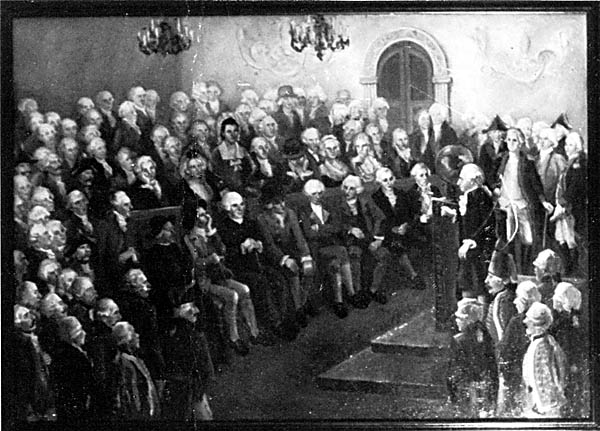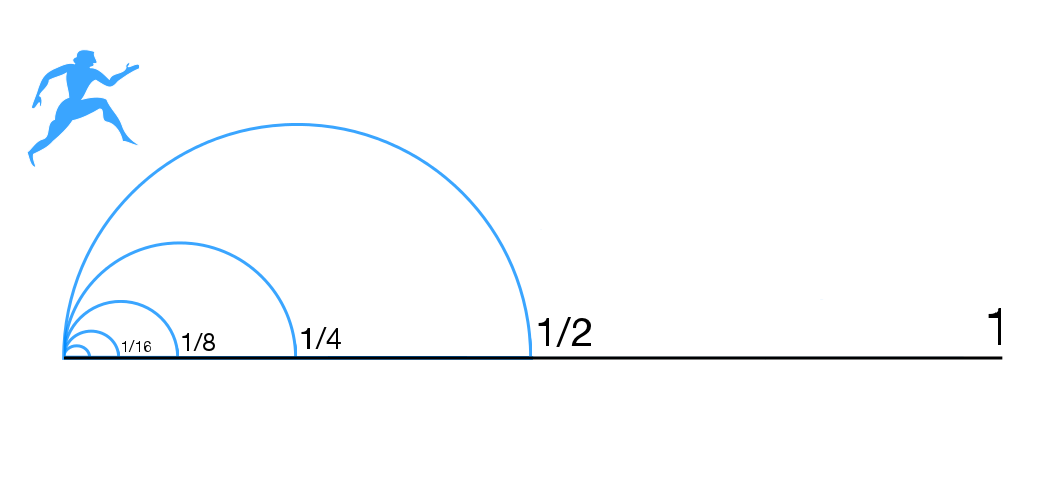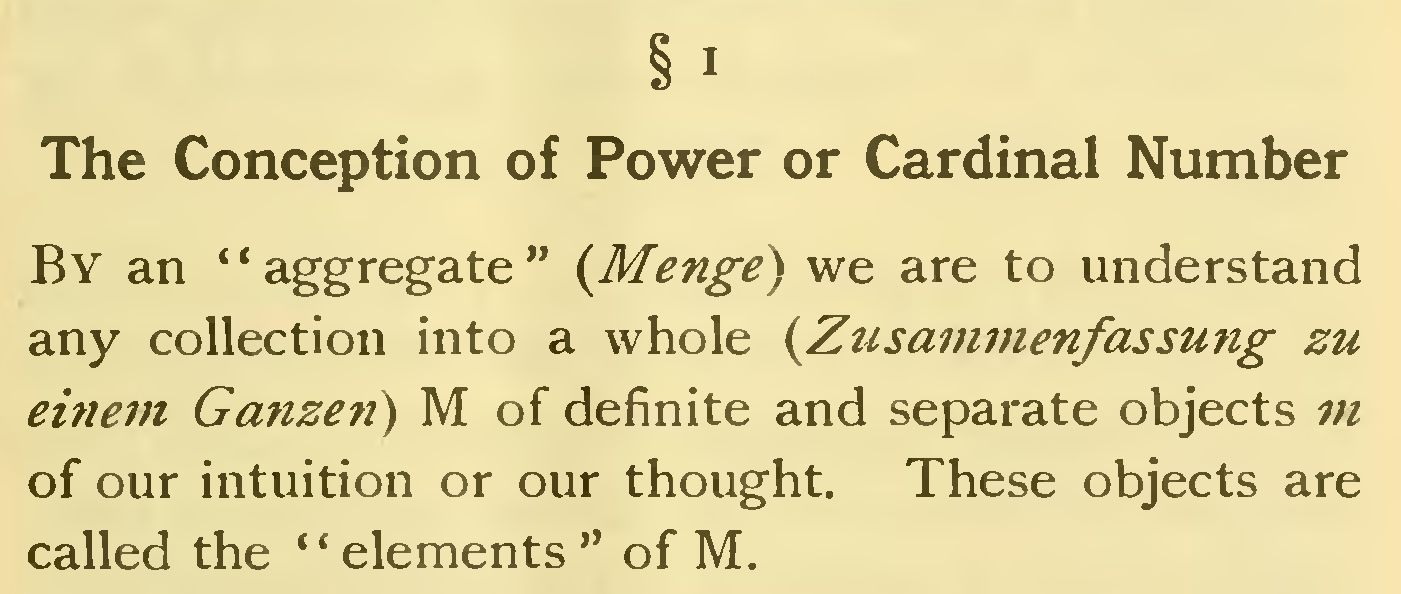|
Antinomy
In philosophy, an antinomy (Ancient Greek: 'against' + 'law') is a real or apparent contradiction between two conclusions, both of which seem justified. It is a term used in logic and epistemology, particularly in the philosophy of Immanuel Kant. Antinomy is a common form of argument in the dialogues of Plato. Kant credited Zeno of Elea (see Zeno's paradoxes) as the inventor of the antinomic mode of argumentation, which he described as a "skeptical method" of "watching, or rather provoking, a conflict of assertions, not for the purpose of deciding in favor of one or the other side, but of investigating whether the object of the controversy is not perhaps a deceptive appearance which each vainly tries to grasp, and in regard to which, even if there were no opposition to overcome, neither can arrive at any result". The antinomic procedure was further developed by Fichte, Schelling and Hegel. Hegel said that Kant was in error when he limited the antinomies to cosmological ideas ... [...More Info...] [...Related Items...] OR: [Wikipedia] [Google] [Baidu] |
Critique Of Pure Reason
The ''Critique of Pure Reason'' (; 1781; second edition 1787) is a book by the German philosopher Immanuel Kant, in which the author seeks to determine the limits and scope of metaphysics. Also referred to as Kant's "First Critique", it was followed by his ''Critique of Practical Reason'' (1788) and ''Critique of Judgment'' (1790). In the preface to the first edition, Kant explains that by a "critique of pure reason" he means a critique "of the faculty of reason in general, in respect of all knowledge after which it may strive ''independently of all experience''" and that he aims to decide on "the possibility or impossibility of metaphysics". Kant builds on the work of Empiricism, empiricist philosophers such as John Locke and David Hume, as well as Rationalism, rationalist philosophers such as René Descartes, Gottfried Wilhelm Leibniz and Christian Wolff (philosopher), Christian Wolff. He expounds new ideas on the nature of Philosophy of space and time, space and time, and trie ... [...More Info...] [...Related Items...] OR: [Wikipedia] [Google] [Baidu] |
Immanuel Kant
Immanuel Kant (born Emanuel Kant; 22 April 1724 – 12 February 1804) was a German Philosophy, philosopher and one of the central Age of Enlightenment, Enlightenment thinkers. Born in Königsberg, Kant's comprehensive and systematic works in epistemology, metaphysics, ethics, and aesthetics have made him one of the most influential and highly discussed figures in modern Western philosophy. In his doctrine of transcendental idealism, Kant argued that space and time are mere "forms of intuition" that structure all experience and that the objects of experience are mere "appearances". The nature of things as they are in themselves is unknowable to us. Nonetheless, in an attempt to counter the philosophical doctrine of Philosophical skepticism, skepticism, he wrote the ''Critique of Pure Reason'' (1781/1787), his best-known work. Kant drew a parallel to the Copernican Revolution#Immanuel Kant, Copernican Revolution in his proposal to think of the objects of experience as confo ... [...More Info...] [...Related Items...] OR: [Wikipedia] [Google] [Baidu] |
Russell's Paradox
In mathematical logic, Russell's paradox (also known as Russell's antinomy) is a set-theoretic paradox published by the British philosopher and mathematician, Bertrand Russell, in 1901. Russell's paradox shows that every set theory that contains an unrestricted comprehension principle leads to contradictions. According to the unrestricted comprehension principle, for any sufficiently well-defined property, there is the set of all and only the objects that have that property. Let ''R'' be the set of all sets that are not members of themselves. (This set is sometimes called "the Russell set".) If ''R'' is not a member of itself, then its definition entails that it is a member of itself; yet, if it is a member of itself, then it is not a member of itself, since it is the set of all sets that are not members of themselves. The resulting contradiction is Russell's paradox. In symbols: : Let R = \. Then R \in R \iff R \not \in R. Russell also showed that a version of the paradox co ... [...More Info...] [...Related Items...] OR: [Wikipedia] [Google] [Baidu] |
Transcendental Dialectic
The ''Critique of Pure Reason'' (; 1781; second edition 1787) is a book by the German philosopher Immanuel Kant, in which the author seeks to determine the limits and scope of metaphysics. Also referred to as Kant's "First Critique", it was followed by his '' Critique of Practical Reason'' (1788) and ''Critique of Judgment'' (1790). In the preface to the first edition, Kant explains that by a "critique of pure reason" he means a critique "of the faculty of reason in general, in respect of all knowledge after which it may strive ''independently of all experience''" and that he aims to decide on "the possibility or impossibility of metaphysics". Kant builds on the work of empiricist philosophers such as John Locke and David Hume, as well as rationalist philosophers such as René Descartes, Gottfried Wilhelm Leibniz and Christian Wolff. He expounds new ideas on the nature of space and time, and tries to provide solutions to the skepticism of Hume regarding knowledge of the relat ... [...More Info...] [...Related Items...] OR: [Wikipedia] [Google] [Baidu] |
Paradox
A paradox is a logically self-contradictory statement or a statement that runs contrary to one's expectation. It is a statement that, despite apparently valid reasoning from true or apparently true premises, leads to a seemingly self-contradictory or a logically unacceptable conclusion. A paradox usually involves contradictory-yet-interrelated elements that exist simultaneously and persist over time. They result in "persistent contradiction between interdependent elements" leading to a lasting "unity of opposites". In logic, many paradoxes exist that are known to be invalid arguments, yet are nevertheless valuable in promoting critical thinking, while other paradoxes have revealed errors in definitions that were assumed to be rigorous, and have caused axioms of mathematics and logic to be re-examined. One example is Russell's paradox, which questions whether a "list of all lists that do not contain themselves" would include itself and showed that attempts to found set theory on ... [...More Info...] [...Related Items...] OR: [Wikipedia] [Google] [Baidu] |
Zeno's Paradoxes
Zeno's paradoxes are a series of philosophical arguments presented by the ancient Greek philosopher Zeno of Elea (c. 490–430 BC), primarily known through the works of Plato, Aristotle, and later commentators like Simplicius of Cilicia. Zeno devised these paradoxes to support his teacher Parmenides's philosophy of monism, which posits that despite people's sensory experiences, reality is singular and unchanging. The paradoxes famously challenge the notions of plurality (the existence of many things), motion, space, and time by suggesting they lead to logical contradictions. Zeno's work, primarily known from second-hand accounts since his original texts are lost, comprises forty "paradoxes of plurality," which argue against the coherence of believing in multiple existences, and several arguments against motion and change. Of these, only a few are definitively known today, including the renowned "Achilles Paradox", which illustrates the problematic concept of infinite divisibi ... [...More Info...] [...Related Items...] OR: [Wikipedia] [Google] [Baidu] |
Twin Paradox
In physics, the twin paradox is a thought experiment in special relativity involving twins, one of whom takes a space voyage at relativistic speeds and returns home to find that the twin who remained on Earth has aged more. This result appears puzzling because each twin sees the other twin as moving, and so, as a consequence of an incorrect and naive application of time dilation and the principle of relativity, each should paradoxically find the other to have aged less. However, this scenario can be resolved within the standard framework of special relativity: the travelling twin's trajectory involves two different inertial frames, one for the outbound journey and one for the inbound journey. Another way to understand the paradox is to realize the travelling twin is undergoing acceleration, which makes him a non-inertial observer. In both views there is no symmetry between the spacetime paths of the twins. Therefore, the twin paradox is not actually a paradox in the sense of a ... [...More Info...] [...Related Items...] OR: [Wikipedia] [Google] [Baidu] |
Jurisprudence
Jurisprudence, also known as theory of law or philosophy of law, is the examination in a general perspective of what law is and what it ought to be. It investigates issues such as the definition of law; legal validity; legal norms and values; and the relationship between law and other fields of study, including Law and economics, economics, Applied ethics, ethics, Legal history, history, Sociology of law, sociology, and political philosophy. Modern jurisprudence began in the 18th century and was based on the first principles of natural law, Civil law (legal system), civil law, and the law of nations. Contemporary philosophy of law addresses problems internal to law and legal systems and problems of law as a social institution that relates to the larger political and social context in which it exists. Jurisprudence can be divided into categories both by the type of question scholars seek to answer and by the theories of jurisprudence, or schools of thought, regarding how those ... [...More Info...] [...Related Items...] OR: [Wikipedia] [Google] [Baidu] |
Exegesis
Exegesis ( ; from the Ancient Greek, Greek , from , "to lead out") is a critical explanation or interpretation (philosophy), interpretation of a text. The term is traditionally applied to the interpretation of Bible, Biblical works. In modern usage, exegesis can involve critical interpretations of virtually any text, including not just religious texts but also philosophy, literature, or virtually any other genre of writing. The phrase ''Biblical exegesis'' can be used to distinguish studies of the Bible from other critical textual explanations. Textual criticism investigates the history and origins of the text, but exegesis may include the study of the historical and cultural backgrounds of the author, text, and original audience. Other analyses include classification of the type of literary genres presented in the text and analysis of grammar, grammatical and syntax, syntactical features in the text itself. Usage One who practices exegesis is called an ''exegete'' (; from Greek ... [...More Info...] [...Related Items...] OR: [Wikipedia] [Google] [Baidu] |
Naive Set Theory
Naive set theory is any of several theories of sets used in the discussion of the foundations of mathematics. Unlike axiomatic set theories, which are defined using formal logic, naive set theory is defined informally, in natural language. It describes the aspects of mathematical sets familiar in discrete mathematics (for example Venn diagrams and symbolic reasoning about their Boolean algebra), and suffices for the everyday use of set theory concepts in contemporary mathematics. Sets are of great importance in mathematics; in modern formal treatments, most mathematical objects (numbers, relations, functions, etc.) are defined in terms of sets. Naive set theory suffices for many purposes, while also serving as a stepping stone towards more formal treatments. Method A ''naive theory'' in the sense of "naive set theory" is a non-formalized theory, that is, a theory that uses natural language to describe sets and operations on sets. Such theory treats sets as platonic absolute o ... [...More Info...] [...Related Items...] OR: [Wikipedia] [Google] [Baidu] |
Philosophy
Philosophy ('love of wisdom' in Ancient Greek) is a systematic study of general and fundamental questions concerning topics like existence, reason, knowledge, Value (ethics and social sciences), value, mind, and language. It is a rational and critical inquiry that reflects on its methods and assumptions. Historically, many of the individual sciences, such as physics and psychology, formed part of philosophy. However, they are considered separate academic disciplines in the modern sense of the term. Influential traditions in the history of philosophy include Western philosophy, Western, Islamic philosophy, Arabic–Persian, Indian philosophy, Indian, and Chinese philosophy. Western philosophy originated in Ancient Greece and covers a wide area of philosophical subfields. A central topic in Arabic–Persian philosophy is the relation between reason and revelation. Indian philosophy combines the Spirituality, spiritual problem of how to reach Enlightenment in Buddhism, enlighten ... [...More Info...] [...Related Items...] OR: [Wikipedia] [Google] [Baidu] |
Theory Of Relativity
The theory of relativity usually encompasses two interrelated physics theories by Albert Einstein: special relativity and general relativity, proposed and published in 1905 and 1915, respectively. Special relativity applies to all physical phenomena in the absence of gravity. General relativity explains the law of gravitation and its relation to the forces of nature. It applies to the cosmological and astrophysical realm, including astronomy. The theory transformed theoretical physics and astronomy during the 20th century, superseding a 200-year-old theory of mechanics created primarily by Isaac Newton. It introduced concepts including 4-dimensional spacetime as a unified entity of space and time, relativity of simultaneity, kinematic and gravitational time dilation, and length contraction. In the field of physics, relativity improved the science of elementary particles and their fundamental interactions, along with ushering in the nuclear age. With relativity, cosmolog ... [...More Info...] [...Related Items...] OR: [Wikipedia] [Google] [Baidu] |






